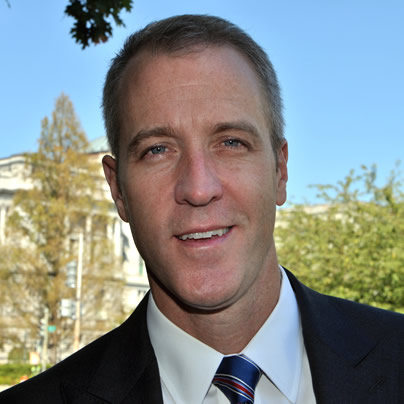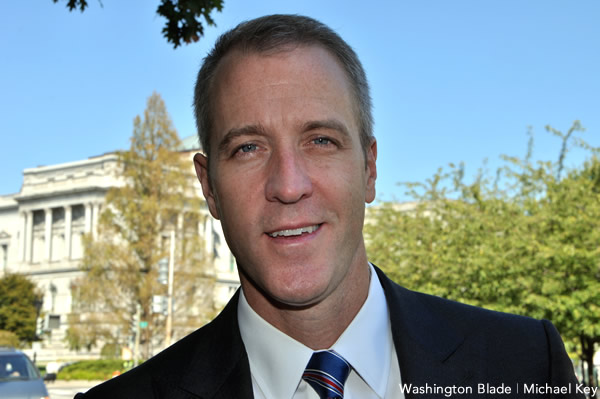National
Election Day brings more out gays to Congress
But balance of power will likely prevent action on LGBT bills


Sean Patrick Maloney was among the openly gay people elected to Congress (Washington Blade file photo by Michael Key)
The results on Election Day were hailed as a milestone as a record number of openly LGBT people were elected to Congress, although prospects for the passage of pro-LGBT legislation next year don’t look promising.
In addition to re-electing President Obama and approving the marriage equality side on ballot initiatives in four states, voters elected at least six openly LGB lawmakers to Congress in addition to electing pro-LGBT lawmakers like Elizabeth Warren in Massachusetts and Sherrod Brown in Ohio.
Tammy Baldwin made history by becoming the first openly gay person elected to the U.S. Senate (see related story) as incumbent Reps. Jared Polis (D-Colo.) and David Cicilline (D-R.I.) were re-elected. Joining them will be Sean Patrick Maloney, who’ll be the first openly gay congressman from New York; Mark Pocan, who’ll occupy the seat Baldwin held in the House; and Mark Takano, a California Democrat who’ll be the first openly gay person of color elected to Congresss.
As of press time, the race to represent Arizona’s 9th congressional district between bisexual Democratic candidate Kyrsten Sinema and Republican Vernon Parker wasn’t yet called. However, Sinema maintained a slim lead in the votes that were already tabulated. If elected, Sinema would be the first bisexual member of Congress.
Chuck Wolfe, CEO of the Gay & Lesbian Victory Fund, acknowledged the night resulted in historic wins in terms of LGBT representation at the federal level of U.S. government.
“It’s without a doubt historic,” Wolfe said. “I think you can talk about the fact that it was history-making, and those that won will be making history for years to come.”
The election results means Congress will look very different in terms of LGBT representation in the wake of Rep. Barney Frank’s (D-Mass.) retirement and Baldwin leaving the House for the Senate. The results also mean that number of openly gay House members will go from four to at least six.
Gay candidates who didn’t win were Republican Richard Tisei, who lost his bid to unseat pro-LGBT Rep. John Tierney (D-Mass.), and lesbian Democrat Nicole LaFavour, who lost her bid to unseat Rep. Mike Simpson (R-Idaho). LaFavour wasn’t endorsed by the Victory Fund.
Despite the excitement, the Election Day results in some respects resulted in the status quo for the legislative and executive branch of the U.S. government from what existed after the 2010 election when no pro-LGBT legislation passed Congress. Democrats retained control of the White House and the Senate, while Republican remain in control of the House.
As of press time, the Senate was poised to have 54 senators caucus with the Democrats and 45 senators caucus with the Republicans, although the Senate race in North Dakota remained too close to call. That would mean a net gain of one Democrat in the Senate. In the House, Republicans retained control of the chamber, but had a slimmer majority of 232 seats while Democrats claimed 191 seats — with 12 races being too close to call.
Chad Griffin, president of the Human Rights Campaign, acknowledged in a conference call with reporters on Wednesday that these results still mean a pro-LGBT majority doesn’t exist in Congress, making the passage of favorable legislation difficult.
On the issue of federal workplace non-discrimination protections, which remain an outstanding issue for the LGBT community, Griffin said in response to a question from the Washington Blade the votes won’t be there to pass legislation known as the Employment Non-Discrimination Act.
“We need to acknowledge that although we certainly made some gains in the Senate, and potentially some gains in the House, we are still short of having a vote for an inclusive ENDA in the House,” Griffin said. “We need to be realistic about that.”
Griffin said “more successes could be seen” on the state and local level and called on the White House to revisit the idea of an executive order barring federal contractors from discriminating against LGBT people, which it said in April it wouldn’t issue at the time.
“It is my hope and belief that we can get an executive order out of this White House,” Griffin said. “It is something that should be done and we will continue to urge our newly re-elected president to do. That would not be the full solution, but it would be a step toward the end goal.”
Tico Almeida, president of Freedom to Work and one of the leading advocates of the executive order, also said it’s time for the White House to reconsider to its decision in the wake of the Election Day results.
“Yesterday was a turning point for our LGBT movement and President Obama has proven that elected officials can stand strongly on the side of LGBT fairness without fear of voter backlash,” Almeida said. “We will continue to push for the president to sign the executive order as soon as possible because every day that passes is another day in which taxpayer money can be squandered on anti-LGBT workplace harassment and discrimination.”
Asked whether the White House would revisit this idea, Shin Inouye, a White House spokesperson said, “I have no updates for you on that issue.”
Almeida also said action could be seen in the Senate to pass ENDA and called for a hearing, mark-up, and full Senate vote in 2013 when lawmakers convene at the start of the next Congress.
“One lesson from recent LGBT advocacy efforts is that we should not wait until the second year of a congressional session to move legislation forward because that’s when some elected officials start getting nervous about the upcoming election and the legislative clock starts to run out of legislative days,” Almeida said.
In the addition to workplace non-discrimination protections, action could be done at the federal level to repeal the Defense of Marriage Act, which prohibits federal recognition of same-sex marriage. Griffin said during the conference call HRC would “continue to push forward” in Congress, but expressed skepticism about passage of any legislation.
“We do have to remember the leadership in the House of Representatives is not a pro-equality set of leaders, so we still have a lot of work to do there, but I can believe we can continue this momentum,” Griffin said.
Griffin placed greater emphasis action from the Supreme Court, which on Nov. 2o will determine whether it will take up litigation challenging California’s Proposition 8 and Section 3 of DOMA. If the court declines to hear the Prop 8 case, it would mean same-sex marriage would almost immediately return to California.
Another question is which states will advance pro-LGBT legislation or relationship recognition bills in the wake of the Election Day results. Griffin said he expects progress there, but said it’s “very early” to determine which states will see action.
Federal Government
Lambda Legal praises Biden-Harris administration’s finalized Title IX regulations
New rules to take effect Aug. 1

The Biden-Harris administration’s revised Title IX policy “protects LGBTQ+ students from discrimination and other abuse,” Lambda Legal said in a statement praising the U.S. Department of Education’s issuance of the final rule on Friday.
Slated to take effect on Aug. 1, the new regulations constitute an expansion of the 1972 Title IX civil rights law, which prohibits sex-based discrimination in education programs that receive federal funding.
Pursuant to the U.S. Supreme Court’s ruling in the landmark 2020 Bostock v. Clayton County case, the department’s revised policy clarifies that discrimination on the basis of sexual orientation and gender identity constitutes sex-based discrimination as defined under the law.
“These regulations make it crystal clear that everyone can access schools that are safe, welcoming and that respect their rights,” Education Secretary Miguel Cardona said during a call with reporters on Thursday.
While the new rule does not provide guidance on whether schools must allow transgender students to play on sports teams corresponding with their gender identity to comply with Title IX, the question is addressed in a separate rule proposed by the agency in April.
The administration’s new policy also reverses some Trump-era Title IX rules governing how schools must respond to reports of sexual harassment and sexual assault, which were widely seen as imbalanced in favor of the accused.
Jennifer Klein, the director of the White House Gender Policy Council, said during Thursday’s call that the department sought to strike a balance with respect to these issues, “reaffirming our longstanding commitment to fundamental fairness.”
“We applaud the Biden administration’s action to rescind the legally unsound, cruel, and dangerous sexual harassment and assault rule of the previous administration,” Lambda Legal Nonbinary and Transgender Rights Project Director Sasha Buchert said in the group’s statement on Friday.
“Today’s rule instead appropriately underscores that Title IX’s civil rights protections clearly cover LGBTQ+ students, as well as survivors and pregnant and parenting students across race and gender identity,” she said. “Schools must be places where students can learn and thrive free of harassment, discrimination, and other abuse.”
Michigan
Mich. Democrats spar over LGBTQ-inclusive hate crimes law
Lawmakers disagree on just what kind of statute to pass

Michigan could soon become the latest state to pass an LGBTQ-inclusive hate crime law, but the state’s Democratic lawmakers disagree on just what kind of law they should pass.
Currently, Michigan’s Ethnic Intimidation Act only offers limited protections to victims of crime motivated by their “race, color, religion, gender, or national origin.” Bills proposed by Democratic lawmakers expand the list to include “actual or perceived race, color, religion, gender, sexual orientation, gender identity or expression, ethnicity, physical or mental disability, age, national origin, or association or affiliation with any such individuals.”
Democratic Gov. Gretchen Whitmer and Attorney General Dana Nessel have both advocated for a hate crime law, but house and senate Democrats have each passed different hate crimes packages, and Nessel has blasted both as being too weak.
Under the house proposal that passed last year (House Bill 4474), a first offense would be punishable with a $2,000 fine, up to two years in prison, or both. Penalties double for a second offense, and if a gun or other dangerous weapons is involved, the maximum penalty is six years in prison and a fine of $7,500.
But that proposal stalled when it reached the senate, after far-right news outlets and Fox News reported misinformation that the bill only protected LGBTQ people and would make misgendering a trans person a crime. State Rep. Noah Arbit, the bill’s sponsor, was also made the subject of a recall effort, which ultimately failed.
Arbit submitted a new version of the bill (House Bill 5288) that added sections clarifying that misgendering a person, “intentionally or unintentionally” is not a hate crime, although the latest version (House Bill 5400) of the bill omits this language.
That bill has since stalled in a house committee, in part because the Democrats lost their house majority last November, when two Democratic representatives resigned after being elected mayors. The Democrats regained their house majority last night by winning two special elections.
Meanwhile, the senate passed a different package of hate crime bills sponsored by state Sen. Sylvia Santana (Senate Bill 600) in March that includes much lighter sentences, as well as a clause ensuring that misgendering a person is not a hate crime.
Under the senate bill, if the first offense is only a threat, it would be a misdemeanor punishable by one year in prison and up to $1,000 fine. A subsequent offense or first violent hate crime, including stalking, would be a felony that attracts double the punishment.
Multiple calls and emails from the Washington Blade to both Arbit and Santana requesting comment on the bills for this story went unanswered.
The attorney general’s office sent a statement to the Blade supporting stronger hate crime legislation.
“As a career prosecutor, [Nessel] has seen firsthand how the state’s weak Ethnic Intimidation Act (not updated since the late 1980’s) does not allow for meaningful law enforcement and court intervention before threats become violent and deadly, nor does it consider significant bases for bias. It is our hope that the legislature will pass robust, much-needed updates to this statute,” the statement says.
But Nessel, who has herself been the victim of racially motivated threats, has also blasted all of the bills presented by Democrats as not going far enough.
“Two years is nothing … Why not just give them a parking ticket?” Nessel told Bridge Michigan.
Nessel blames a bizarre alliance far-right and far-left forces that have doomed tougher laws.
“You have this confluence of forces on the far right … this insistence that the First Amendment protects this language, or that the Second Amendment protects the ability to possess firearms under almost any and all circumstances,” Nessel said. “But then you also have the far left that argues basically no one should go to jail or prison for any offense ever.”
The legislature did manage to pass an “institutional desecration” law last year that penalizes hate-motivated vandalism to churches, schools, museums, and community centers, and is LGBTQ-inclusive.
According to data from the U.S. Department of Justice, reported hate crime incidents have been skyrocketing, with attacks motivated by sexual orientation surging by 70 percent from 2020 to 2022, the last year for which data is available.
Twenty-two states, D.C., Puerto Rico, and the U.S. Virgin Islands have passed LGBTQ-inclusive hate crime laws. Another 11 states have hate crime laws that include protections for “sexual orientation” but not “gender identity.”
Michigan Democrats have advanced several key LGBTQ rights priorities since they took unified control of the legislature in 2023. A long-stalled comprehensive anti-discrimination law was passed last year, as did a conversion therapy ban. Last month the legislature updated family law to make surrogacy easier for all couples, including same-sex couples.
A bill to ban the “gay panic” defense has passed the state house and was due for a Senate committee hearing on Wednesday.
Indiana
Drag queen announces run for mayor of Ind. city
Branden Blaettne seeking Fort Wayne’s top office

In a Facebook post Tuesday, a local drag personality announced he was running for the office of mayor once held by the late Fort Wayne Mayor Tom Henry, who died last month just a few months into his fifth term.
Henry was recently diagnosed with late-stage stomach cancer and experienced an emergency that landed him in hospice care. He died shortly after.
WPTA, a local television station, reported that Fort Wayne resident Branden Blaettne, whose drag name is Della Licious, confirmed he filed paperwork to be one of the candidates seeking to finish out the fifth term of the late mayor.
Blaettner, who is a community organizer, told WPTA he doesn’t want to “get Fort Wayne back on track,” but rather keep the momentum started by Henry going while giving a platform to the disenfranchised groups in the community. Blaettner said he doesn’t think his local fame as a drag queen will hold him back.
“It’s easy to have a platform when you wear platform heels,” Blaettner told WPTA. “The status quo has left a lot of people out in the cold — both figuratively and literally,” Blaettner added.

The Indiana Capital Chronicle reported that state Rep. Phil GiaQuinta, who has led the Indiana House Democratic caucus since 2018, has added his name to a growing list of Fort Wayne politicos who want to be the city’s next mayor. A caucus of precinct committee persons will choose the new mayor.
According to the Fort Wayne Journal Gazette, the deadline for residents to file candidacy was 10:30 a.m. on Wednesday. A town hall with the candidates is scheduled for 6 p.m. on Thursday at Franklin School Park. The caucus is set for 10:30 a.m. on April 20 at the Lincoln Financial Event Center at Parkview Field.
At least six candidates so far have announced they will run in the caucus. They include Branden Blaettne, GiaQuinta, City Councilwoman Michelle Chambers, City Councilwoman Sharon Tucker, former city- and county-council candidate Palermo Galindo, and 2023 Democratic primary mayoral candidate Jorge Fernandez.
-

 District of Columbia2 days ago
District of Columbia2 days agoReenactment of first gay rights picket at White House draws interest of tourists
-

 District of Columbia2 days ago
District of Columbia2 days agoNew D.C. LGBTQ+ bar Crush set to open April 19
-

 Arizona2 days ago
Arizona2 days agoAriz. governor vetoes anti-transgender, Ten Commandments bill
-

 Africa4 days ago
Africa4 days agoUgandan activists appeal ruling that upheld Anti-Homosexuality Act










